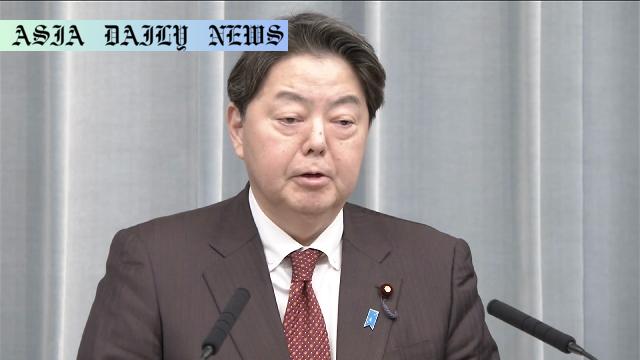Japan maintains its stance on WHO amidst US withdrawal.
Japan will monitor the impacts of the US withdrawal from WHO.
The US begins its process to leave WHO under an executive order by Trump.
Japan emphasizes WHO’s critical role in addressing global health issues.
Japan continues to collaborate with the US on international matters.
Japan reiterates its stance on North Korea’s nuclear and missile programs.

Japan’s Reaction to US Withdrawal from WHO
Japan has announced that it will closely monitor the implications of the United States’ decision to withdraw from the World Health Organization (WHO). This significant move by the US, initiated through an executive order by the newly sworn-in President Donald Trump, has drawn considerable global attention. Despite this development, Japan’s approach to the WHO remains consistent, with the country reaffirming its strong support for the organization’s mission and activities.
WHO as a Crucial Player in Global Health
Japan continues to view the WHO as a pivotal institution in addressing global health challenges, ranging from pandemics to chronic diseases. Chief Cabinet Secretary Hayashi Yoshimasa, speaking to reporters, emphasized the importance of the WHO in utilizing scientific knowledge to address health issues worldwide. He expressed hope that the organization would continue fulfilling its responsibilities irrespective of the United States’ withdrawal.
US-Japan Collaboration in Health Matters
Although the US withdrawal marks a significant geopolitical shift, Japan has reiterated the importance of working collaboratively with the United States on health and international issues. Hayashi underlined the US’s role as an essential contributor to global health initiatives and indicated Japan’s interest in maintaining strong cooperation with the country.
Japan’s Stance on North Korea
In addition to addressing the implications of the US decision regarding the WHO, Japan also commented on North Korea. President Trump recently referred to North Korean leader Kim Jong Un as a ‘nuclear power’ and highlighted their personal rapport. In response, Chief Cabinet Secretary Hayashi reiterated Japan’s firm opposition to North Korea’s nuclear weapons and missile development programs, labeling them as unacceptable threats to regional and global peace. Japan committed to continued collaboration with the US and other nations in countering North Korea’s provocations, as well as addressing long-standing issues such as abductions by North Korean agents.
Broader Global Implications
The US move to exit the WHO raises questions about the future of international health governance and funding. As one of the WHO’s primary funders, the US withdrawal may leave a financial and leadership vacuum, potentially affecting the organization’s ability to respond to global health crises. Countries like Japan, which remain committed to the WHO, may need to step up their financial and political contributions to ensure the organization’s stability and efficacy.
Balancing National Interests and Global Responsibilities
Japan finds itself navigating a complex landscape where maintaining strong alliances, particularly with the United States, is critical, while also supporting multilateral institutions like the WHO. Striking a balance between these objectives underscores Japan’s commitment to both safeguarding its national interests and fulfilling its global responsibilities.
Conclusion
The decision by the United States to exit the WHO marks a turning point in international relations and the global health landscape. Japan’s measured response, reaffirming its commitment to the WHO while emphasizing the importance of US collaboration, highlights its diplomatic approach to navigating such challenges. As the world watches these developments unfold, Japan’s role as a bridge between the United States and multilateral bodies like the WHO may become increasingly significant.
Commentary
Japan’s Steady Hand in Global Affairs
Japan’s response to the United States’ withdrawal from the World Health Organization reflects a pragmatic and measured approach characteristic of its foreign policy. In an era marked by geopolitical uncertainty, Japan’s reaffirmation of support for the WHO underscores its dedication to multilateralism and its recognition of the critical importance of global health as a shared responsibility.
Strategic Importance of US-Japan Relations
The emphasis on continued collaboration with the United States, despite the latter’s decision to step away from the WHO, highlights the strategic importance of US-Japan relations. Japan’s careful balancing act seeks to maintain strong ties with its most crucial ally while remaining aligned with the principles of global governance and multilateral cooperation.
Implications for Global Health Governance
The US withdrawal from the WHO poses significant challenges not only for the organization but also for its member states. As one of the most significant contributors to the WHO’s financial and operational framework, the United States has played a critical role in shaping its global health initiatives. Japan’s commitment to the WHO may serve as a stabilizing force during this transitional period, ensuring that key global health programs continue to receive the support they need.
Final Thoughts
Japan’s diplomatic stance reflects a clear understanding of the complexities of modern international politics. By supporting the WHO and emphasizing collaboration with the US, Japan seeks to ensure that global health remains a priority, even amidst significant geopolitical shifts. Moving forward, Japan’s leadership in fostering dialogue and cooperation may prove invaluable in addressing emerging global health challenges.


